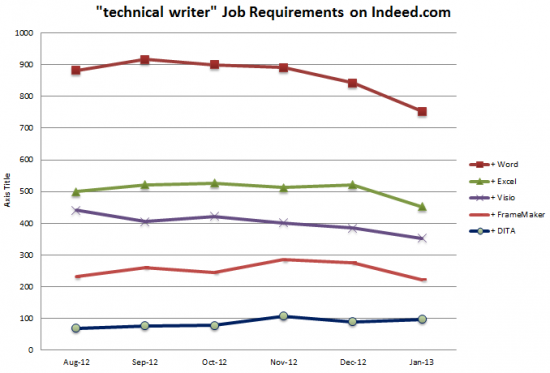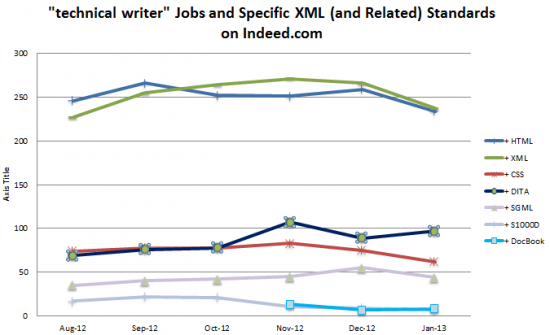
4% …and growing.
About half-a-year ago Mekon colleague Rachel Johnson asked me whether I knew what percentage of technical writing jobs out there are DITA-related. I said I didn’t know, and became intrigued with finding the answer to that question. While I have a lengthy list of companies using DITA, I wondered what percentage that represented in terms of the total number of technical writing positions that are out there.
So I set out to find out for myself.
The Process
Anyone who is familiar with looking for a job online in the States is likely familiar with indeed.com which is a web site that aggregates job listings from other sources. It is the largest job site available, surpassing in popularity other well-known job-seeking sites like Monster.com and CareerBuilder. One of the reasons for its popularity is not just because it brings together so many jobs together in one place—reportedly over 1 million new jobs every week—but because its search engine is particularly good, so job seekers can find better matches for the types of positions they are seeking.
Beginning at the end of last August I started keeping track of the total number of technical writing jobs listed on Indeed.com and then matched them to common terms for requirements, such as “FrameMaker”, “Word”, “Acrobat” and of course “DITA”. Every month for the past six months I have run the same searches and compiled the results. Specifically I would run a search for “technical writer” + [term], so that I would find all tech writing positions that also mentioned the additional search term. There are some shortcomings to this approach, since the sheer numbers means I can’t check every job entry specifically, so not every “technical writer” job listing necessarily lists something like “DITA” (or “RoboHelp”, or “HTML” etc.), as a requirement, just that it appears somewhere in the job description.
The Results
One thing that immediately became clear: if you are looking to be a technical writer, don’t give up on your Word or Excel skills, since by far they were the two terms most often associated with technical writing job searches. “Word” is present in roughly 30% of all technical writer jobs posted, with Excel hovering around the 20% mark. Manuals produced using Word are less common now than they used to be, but it is clear that it is still widely used. Stalwart Adobe FrameMaker is mentioned in just over 10% of all “Technical Writer” jobs listed on Indeed.com, proving that it still widely used.
Compared to these software programs, technical writing jobs seeking some form of DITA experience comes in at about 4%, so just under half of all of similar jobs looking for people who have used FrameMaker. This doesn’t tell the whole tale though—what I find most interesting is that there is downward trend for tech writing jobs in the traditional MS Office programs across the board. And DITA is growing…

To be fair I don’t think the two are necessarily related, but what I can say with some confidence is that over the past half-year jobs looking for some form of DITA experience has grown from 2.6% in August 2012 to just over 4% in January 2013 in what appears to be a steady, growing trend. All MS Office programs are trending downward in this job category. I can’t honestly explain it and it will be interesting to see if this will be a continuing trend. Despite the dip in the numbers in January for FrameMaker, there is no clear trend up or down for this program.
DITA Jobs Compared to Other Documentation Standards
The other thing I wanted to find out was whether or not DITA was in fact more popular than other documentation standards out there. So some of the other terms I kept plugging in along with “technical writer” over six months included:
- HTML
- XML
- CSS
- SGML
- S1000D
- DocBook
Now the first three are more generic in nature so I figured that they would likely be more popular than DITA, since many technical writing jobs have some requirement for some sort of web page content. I wasn’t sure about the rest, which are all documentation standards that have been around longer than DITA.
Here’s what came up:

DITA turned out to be far-and-away a more popular documentation standard for current tech writing jobs, and to my surprise even more popular than CSS.
The average percentage for the major tech doc standards for the period surveyed are:
- DITA: 3.23%
- SGML: 1.63%
- S1000D: 0.53%
- DocBook: 0.36%
According to studies done several years ago by both Gartner and Forrester, DITA was the fastest growing XML standard for structured publications. It still is.
Next time: Who’s hiring and is DITA just for Technical Writers?

So after seven years of being an open standard, DITA skills are currently as in demand as say Author-it or WebWorks e-Publisher?
Considerably more so actually. I didn’t just do searches on the terms mention above but several others as well, including “RoboHelp”, “InDesign”, “Flare”, “Author-It”, “WebWorks” and a few others. Here’s the average percentage in which these terms (and a few others already mentioned in the article for comparison) appeared in job listings looking for Technical Writers for the past six months:
– FrameMaker = 9.43%
– RoboHelp = 5.20%
– DITA = 3.2% (again, this the average)
– InDesign = 2.76%
– Flare = 2.73%
– WebWorks = 0.75%
– Author-It = 0.35%
In all I am checking against 28 commonly-used technical writing standards and programs every month. Will likely write this up in a future article, though I am waiting until the latest results from the WritersUA User Assistance Tools Survey are in as a basis for comparison.
Thanks for the question!
Interesting study and results. I look forward to your future article on it as well.
Because DITA isn’t a tool, I wonder if it’s meaningful to compare it to tools, some of which support DITA (such as FM). Similarly, CSS is also a standard not a tool, and can be generated by Flare, etc. From my experience as both a hiring manager and a job seeker, I know we’re probably not getting the whole story from the job ads! 🙂 Still, you have to work with what you have.
I always wonder about MS Word, Excel, etc in job ads. I wonder if it’s more a sign that the rest of the company uses Office, rather than a tech doc tool, so a writer needs to be familiar with it to work with others. The decline in mentions of Word in ads could also reflect the move by many organization to other solutions such as Google Docs, etc.
I agree with you that job ads definitely do not tell the whole story. And while I take your point about comparing DITA to tools–potentially an “apples and oranges” situation–I would have actually expect the tools to come out higher in the rankings than they actually did, rather than lower. In my experience there is generally a bias that favours software tools over standards, since you can readily prove familiar with a program through something like a certificate, and less so for a standard (DITA certificate anyone? 😉 )
Have also learned that just because a job is seeking someone who is “familiar” with “XML/DITA” it does not mean that the job actually requires either, but what it does seem to signal at the very least is that the idea of DITA being a generally good thing has percolated into upper management at enough firms that it is clearly worthwhile adding to a job listing. More about this in the article I am currently working on.
Am sure you are right about MS Office, and that it is mentioned because the firm has a site license for the software and expects people to know how to use those tools at the very least, rather than doing technical documentation directly with them (though I have run into a few exceptions to that!) The seeming decline of MS Office software in job ads is very interesting, and I will make a point of keeping an eye out for alternatives such as Google Docs making an appearance in them. Time will tell if this is a real trend or not.